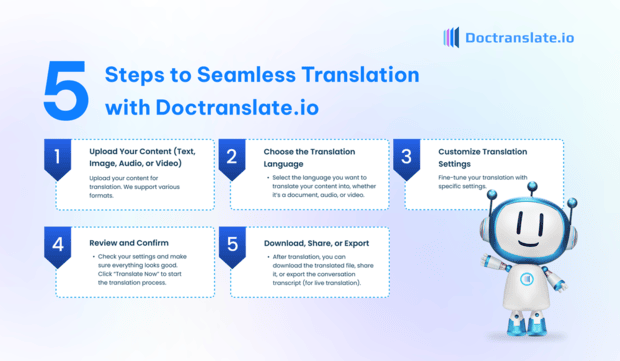Introduction
In today’s interconnected world, the ability to translate technical documents is more crucial than ever. Whether you’re expanding your business globally or collaborating with international teams, language should not be a barrier.
Translating technical documents from English to Thai accurately can be complex due to specific terminologies and industry-specific language. This is where Doctranslate.io comes in as your optimal solution.
Doctranslate.io offers a seamless and efficient way to translate your technical documents, ensuring accuracy and maintaining context. It simplifies the translation process, making it accessible to everyone.
This guide will walk you through the simple steps to translate your technical documents from English to Thai using Doctranslate.io, ensuring a smooth and precise translation experience.
Step-by-Step Guide: Translating Technical Documents from English to Thai with Doctranslate.io
Step 1: Upload Your Content
Start by uploading your technical document to Doctranslate.io. The platform supports various document formats to accommodate your needs.
You can easily upload files in formats such as:
- .DOCX
- .TXT
- and more.
Simply drag and drop your file or select it from your computer to begin the translation process. To upload your document now, visit Translate Document.
Step 2: Choose the Translation Language
After uploading your technical document, the next step is to specify your desired languages. For this translation, set English as the source language and Thai as the target language.
Doctranslate.io supports a wide array of languages, ensuring you can translate your documents to and from virtually any language you need. Select Thai to proceed with your English to Thai technical document translation.
Step 3: Customize Your Translation Settings
Doctranslate.io allows you to customize your translation settings to achieve the best possible results for your technical documents.
You can fine-tune your translation by:
- Choosing the appropriate tone to match the formality of your technical document.
- Selecting a specific domain to ensure industry-specific terminology is accurately translated.
- Utilizing the bilingual option if you need a side-by-side comparison of the original and translated text.
- Leveraging ‘My Dictionary’ to incorporate specific technical terms and ensure consistent translation of key phrases.
Customize your settings for optimal technical document translation at Customize Document Translation.
Step 4: Review and Confirm
Before initiating the translation, take a moment to review your selected settings. Ensure that English is set as the source language and Thai as the target language.
Double-check any customizations you’ve made, such as tone, domain, and dictionary preferences, to confirm they align with your requirements for translating technical documents.
Once you are satisfied with your settings, simply click the “Translate Now” button to start the translation process with Doctranslate.io.
Step 5: Download, Share, or Export
Once Doctranslate.io completes the translation of your technical document, you will have several options for accessing your translated file.
You can directly download the translated document to your computer, making it easy to save and use offline.
Doctranslate.io also provides options to share the translated document directly or export it in various formats if needed, enhancing collaboration and accessibility.

Conclusion
Translating technical document from English to Thai is now straightforward and efficient with Doctranslate.io. By following these five simple steps, you can easily overcome language barriers.
Doctranslate.io ensures accurate and reliable translations, tailored to the specific needs of technical content. Start translating your technical documents today and broaden your global reach.
Experience the ease and power of Doctranslate.io for all your translation needs. From documents to images, audio, and video, Doctranslate.io is your all-in-one translation solution.
Don’t let language barriers hold you back. Visit Doctranslate.io now and unlock seamless communication across languages!


Leave a Reply